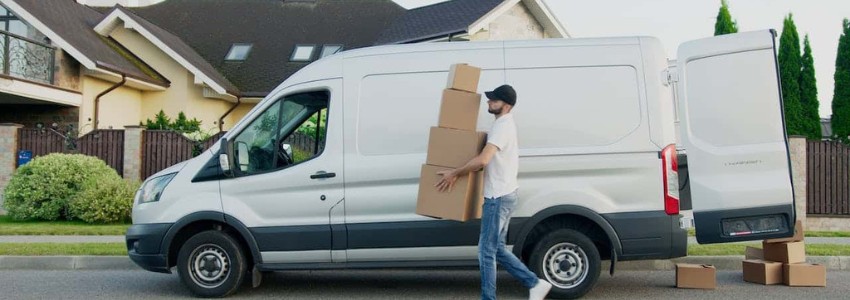Van insurance is a vital consideration for van owners and operators in the United Kingdom, offering protection and peace of mind in case of accidents, theft, or other unexpected events. When it comes to van insurance, there are two primary categories to choose from: commercial van insurance and personal van insurance. Each type of insurance serves different purposes and has specific coverage options. In this guide, we’ll explore the key differences between commercial van insurance and personal van insurance in the UK, helping you make an informed decision about which one is right for you.
Intended use
The most significant difference between commercial and personal van insurance is the intended use of the van.
Each type is designed to cover a different set of activities:
Commercial van insurance is intended for vans primarily used for business purposes. It’s suitable for van operators who use their vehicle for delivering goods, services, trades, or any other commercial activity and covers business-related travel, including transporting tools, equipment, or goods for profit.
Personal van insurance is designed for vans used for personal or non-commercial purposes and is appropriate for individuals who use their van for family, recreational, or personal activities. It typically excludes coverage for business-related use.
Coverage options
Commercial and personal van insurance also differ in terms of the coverage options they provide.
Commercial van insurance offers a range of business-specific coverage options, such as goods-in-transit insurance, business interruption coverage, and coverage for tools and equipment. It typically includes coverage for multiple drivers, making it suitable for businesses with employees who may drive the van. It may provide coverage for commercial signage or advertising on the van.
Personal van insurance focuses on coverage for personal use, such as commuting, running errands, or family outings. It generally excludes business-related coverage options like goods-in-transit insurance and primarily covers the policyholder and family members who drive the van.
Premium costs
The cost of van insurance varies significantly between commercial and personal policies due to differences in risk and usage.
Commercial van insurance policies often come with higher premiums due to the increased risk associated with business use. Premiums are influenced by factors such as the type of business, the van’s use (e.g., delivery or trades), and the driver’s commercial driving experience.
Personal van insurance policies typically have lower premiums as they cover less risky uses. Premiums are based on factors like the driver’s personal history, the van’s make and model, and the intended personal use.
No claims bonus
The concept of a no claims bonus, or no claims discount, applies to both commercial and personal van insurance, but there are differences in how it’s typically implemented:
Commercial van insurance no claims bonuses are often separate from personal policies. Accumulating a no claims bonus for commercial van insurance may not impact your personal van insurance no claims discount.
Personal van insurance and commercial van insurance policies may share a no claims bonus, allowing you to transfer your no claims discount between the two types of coverage if applicable.
Named vs. any driver
The driver options also vary between commercial and personal van insurance:
Commercial van insurance policies can include options for named drivers or any driver, depending on the needs of the business. Adding named drivers may help reduce premiums for experienced, low-risk drivers.
Personal van insurance policies typically cover the policyholder and may include additional named drivers, often family members. Any driver options are less common for personal van insurance.
Vehicle modifications
If you plan to modify your van for specific business needs, it’s important to consider how these modifications might impact your insurance:
Commercial van insurance policies are generally more accommodating of vehicle modifications, especially those related to business use, such as racking or shelving. Some modifications may be included in the coverage, while others may require additional endorsements.
Personal van insurance policies may have limitations on modifications and accessories coverage, as they primarily cater to personal use.
Commercial use definition
The definition of “commercial use” can vary between insurance providers, so it’s crucial to understand how your insurer defines it:
Commercial van insurance policies provide coverage for a broad range of commercial activities, including delivery, trades, services, and more. The definition of “commercial use” can be quite flexible, encompassing various business purposes.
Personal van insurance policies generally exclude any form of commercial use, which means using the van for business-related activities may result in a claim being denied.
Policy documentation
Another key difference lies in the policy documentation and the information you need to provide:
Commercial van insurance policies require detailed information about your business, including the nature of your operations and the types of goods or services you transport. You may need to provide proof of your business, such as invoices or contracts, to validate the commercial use.
Personal van insurance policies focus on the policyholder’s personal information, driving history, and intended personal use of the van.
Claims process
The claims process for commercial and personal van insurance can also differ, especially in terms of how claims are assessed and paid out:
Commercial van insurance claims are evaluated with consideration of the van’s business use and the specific circumstances of the claim. Business-related claims, such as damage to goods in transit, may have different assessment criteria.
Personal van insurance claims are typically assessed based on personal use, such as commuting or family outings. The claims process for personal policies is generally more straightforward and standard.
Shopping around
When it comes to choosing the right van insurance, whether commercial or personal, shopping around for the best deal and coverage options is crucial. Different insurance providers may offer various policies and discounts tailored to your needs, so it’s essential to compare quotes and consider the specific requirements of your van usage.
Tip: Consult with multiple insurance providers, review policy documents carefully, and ask questions to ensure you fully understand the coverage and discounts available to you.
Selecting the right type of van insurance, whether commercial or personal, depends on the intended use of the van and your unique circumstances. Commercial van insurance is tailored for business use, offering coverage options that suit the needs of companies and professionals. Personal van insurance is designed for non-commercial, personal activities, such as commuting or family outings, and generally comes with lower premiums. By understanding the key differences between these two types of insurance, you can make an informed decision to ensure your van is adequately protected while staying within your budget and compliance with the law.
Want to take the next step? Compare van insurance on MoneySpider today.








